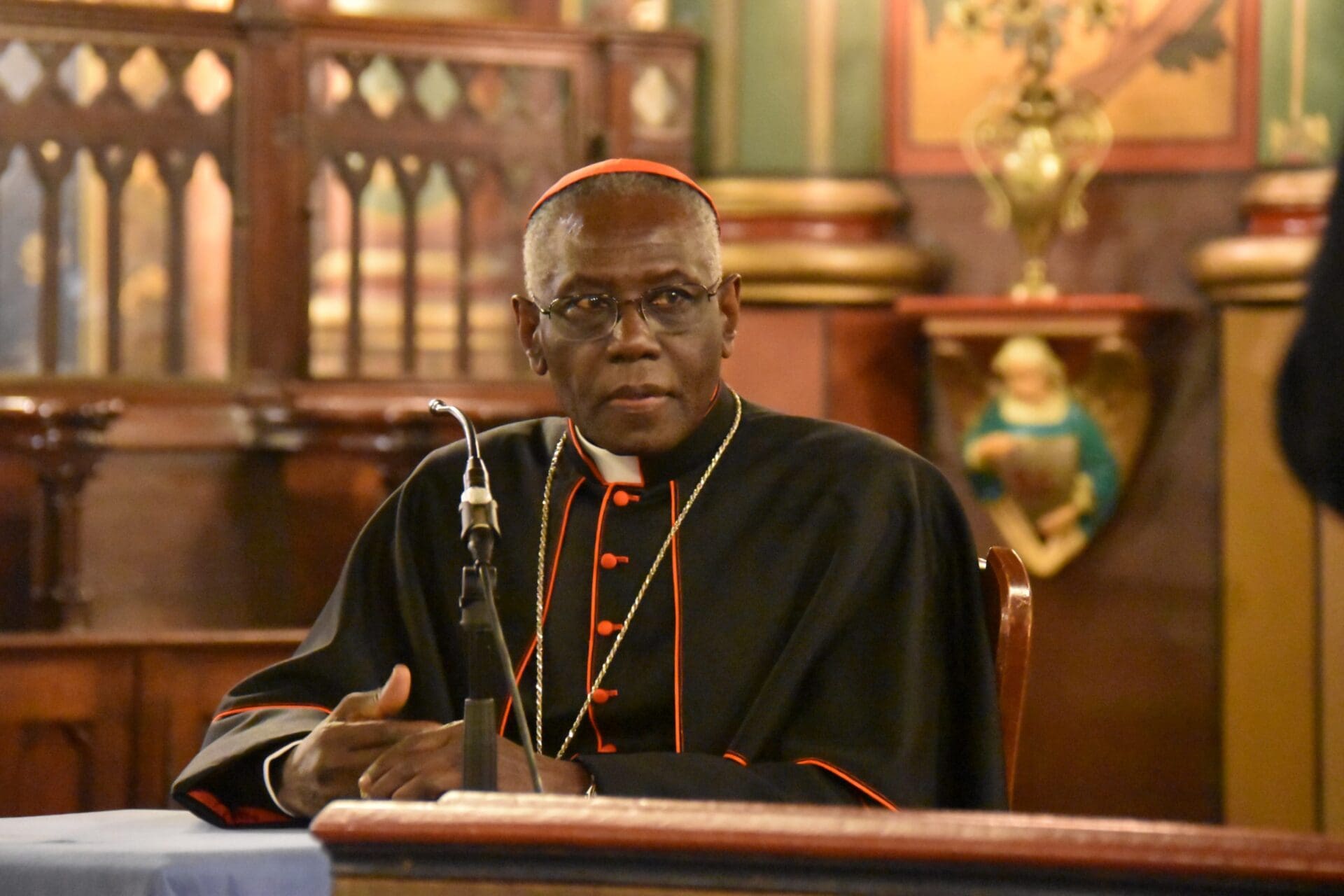Pope Francis’ recent claim that “a great majority of our sacramental marriages are null” (or later edited by the Vatican to read “some of our sacramental marriages are null”) drew a wide range of responses from both Catholic and secular commentators. The Pope’s comments and the resulting reactions to them show that any fruitful conversation about the validity of the sacrament of marriage and the pastoral care that flows from it must be grounded in a clear understanding of the elements needed for the validity of sacraments in general and how these elements apply to the sacrament of marriage in particular.
Elements for Sacramental Validity
Basic catechesis on sacramental validity often reduces the elements necessary for a valid sacramental act to two—namely, that it is done with proper matter and proper form. In actuality, two additional requirements are necessary—that the sacrament is administered and received by the proper persons; and that the minister of the sacrament has the proper intention to do as the Church does.
For each sacrament, these four elements play out in unique ways proper to each. Some requirements for validity are based on divine or natural law, such as the reservation of Holy Orders only to baptized men (cf. CCC 1577) or marriage being solely between one man and one woman (cf. Code of Canon Law, canon 1055). These requirements the Church does not have the authority to change or to act otherwise.
In addition to these, there are also elements based on ecclesiastical law that can render a sacramental act invalid. In instituting the sacraments, Christ has also entrusted to his Church the authority over the sacraments and as such, the supreme authority of the Church is able to approve or define the requirements for their validity (canon 841). This approval however should always be done officially in order to be binding (cf. can. 10) and can never be in contradiction to natural or divine law. Based on the lived experience of the Church and her prudence, these elements can be added or taken away via the proper authority in the Church as, for example, in the proper form of the sacrament of marriage. Since the time of the Council of Trent, the Church has required as proper form the act of marrying to be done in a specific way. Called the “canonical form of marriage,” these elements are now enshrined in canons 1108ff and liturgically fleshed out in the Rite of Marriage.
Proper Persons & Sacramentality
As applied to marriage, the proper persons who can marry validly are those who do not fall under the “diriment impediments” listed in canons 1083- 1094 of the Code of Canon Law. Diriment impediments are those things that render a person incapable of establishing marriage. Some of these are considered to be of divine or natural law, such as when a person is “obliged by the bond of a previous marriage” (can. 1085). These impediments apply to all persons who seek to marry validly. Other diriment impediments are ecclesiastical laws, such as when a person is not of canonical age (can. 1083). These impediments apply only to Catholics and those who are marrying Catholics (cf. cann. 11 and 1059).
From this discussion, it must be clearly understood that before a marriage can be a sacrament, it must first be a valid natural marriage, that is, the parties must be capable (i.e. free from any diriment impediments) and consent properly to marriage (a Catholic has the additional requirement of marrying according to canonical form mentioned above).
This natural marriage becomes one of the seven sacraments of the Church only if it is validly entered into by two capable persons who are baptized, thus satisfying the “proper person” requirement of sacramental validity. This requirement is necessary because baptism is the “gateway to the sacraments” (can. 849). Since marriage was a natural institution before Christ our Lord took it and raised it to the dignity of a sacrament between baptized persons (can. 1055), the marriage of non-baptized persons or the marriage between one baptized person and a non-baptized person may be valid naturally but cannot be a sacrament. Between baptized spouses, however, the valid natural marriage cannot but be a sacrament (can. 1055 §2).
Proper Intention
While the four elements necessary for sacramental validity are common to all the sacraments, a common mistake is to assume that the requirements for validity for one sacrament are the same for other sacraments. While it is easy to see that proper matter and proper form differ from sacrament to sacrament, it is often misunderstood that sacramental intention does often differ from sacrament to sacrament.
The intention to “do as the Church does” cannot simply be translated from one sacrament to another. In other words, the elements for a valid intention for one sacrament may differ from that required for another sacrament.
When it comes to marriage, the various canonical requirements of matrimonial consent ensure that a person is “intending to do as the Church does.” It is important to realize that each element that could invalidate matrimonial consent—force, fear, ignorance, error, psychic (i.e. mental) incapacity, etc.—has specific nuances and requirements for it to be invalidating. Failure to understand these causes lead many to make hasty generalizations that most or many marriages “must be invalid” simply if one of these is present.
While it is true that ignorance, error, or intention against elements of marriage can at times invalidate the consent necessary to establish marriage, there must be certain elements present in each of these in order to render matrimonial consent invalid. It is not just any sort of ignorance, error, or intention against elements of marriage that make for invalid consent but a very specific type of each.
Ignorance and Marrying Validly
When it comes to ignorance about marriage, many assume that if a person marries while ignorant of what marriage is or what the Church teaches about marriage, the consent is invalid. However, canon 1096§1 of the Code of Canon Law specifically lays out what type of ignorance it must be. For matrimonial consent to be valid, the parties must “at least not be ignorant that marriage is a permanent partnership between a man and a woman ordered to the procreation of offspring by means of some sexual cooperation.”
Notice that the Church does not require acceptance or even knowledge of the full spectrum of her teachings on marriage, its elements, proprieties, or sacramentality to marry validly. Rather, under canon 1096 §1, a person is “ignorant” of marriage, and thus marries invalidly, only if he or she does not know that marriage involves these two parties to enter into it validly. In fact, canon 1096 §2 goes on to say that ignorance of these two aspects of marriage is not presumed after puberty.
Error and Marrying Validly
In the same way, it is a common mistake to assume that because of the poor level of catechesis or because of the “divorce culture” in which we live, many people have an erroneous understanding of marriage and therefore must be marrying invalidly. Contrary to this popular misconception, those who are simply in error about marriage, its permanence, its fecundity, its exclusivity, or its sacramental dignity can still marry validly. Canon 1099 explicitly says that this simple error does not nullify matrimonial consent. It further goes on to distinguish that such error about marriage only invalidates consent if the error “determines the will.” In other words, a person marries invalidly due to error about marriage only if the error is what causes a party to choose actively, and in this particular marriage relationship, something other than a true marriage.
A person who believes in the possibility of divorce still marries validly unless he or she actively and explicitly chooses at the time of marrying for this particular marriage to be a dissoluble one, that is, if the error “determines the will.” A general erroneous belief in divorce or general error about an aspect of marriage is simply not enough to invalidate. Therefore, it cannot simply be said that most marriages are invalid just because there is a divorce culture or because the level of catechesis on marriage is poor.
In his addresses to the Roman Rota in 1993 and 2000, Pope St. John Paul II explicitly underscored this notion that error only invalidates matrimonial consent if it “determines the will.” Pope Francis himself emphasized this same point about the will in his address to the Roman Rota this past January 2016: “A lack of formation in the faith and error with respect to the unity, indissolubility and sacramental dignity of marriage invalidate marital consent only if they influence the person’s will (cf. CIC c. 1099). It is for this reason that errors regarding the sacramentality of marriage must be evaluated very attentively.”
Intention Against Elements of Marriage
Like error, the intention against certain essential elements or properties of marriage (called “partial simulation”) only invalidates matrimonial consent under specific circumstances. A similar mistake is made here in hastily concluding that if a party uses contraception, believes in divorce, or commits adultery, he or she has not married validly. But this is not necessarily the case.
An intention to exclude these from one’s matrimonial consent only invalidates if it is a positive act of the will, that is, if the exclusion of these is chosen actively and positively at the time of the act of marrying. For a person to give invalid consent, there cannot be a mere erroneous belief about marriage (as seen above) nor can there be a passive intention (e.g., simply just not thinking about, for example, whether to have children in this marriage), nor can it be a moral failing (e.g., even serious ones such as use of artificial contraception or adultery), nor can it be simply growing up in a divorce culture or believing in divorce. The choice to exclude the good of children, permanence, exclusivity, or the good of the other spouse must be deliberately, consciously, and actively chosen at the time of marrying in order for the consent to be invalid.
Presumption of Validity
Pastors and pastoral workers especially can render a great disservice to spouses and the sacrament of matrimony when certain broad assumptions are made concerning invalidity of marriage, particularly assuming the invalidity of a particular marriage. Church law vehemently guards against this stance, requiring instead the presumption that average persons are indeed capable of marrying and that the consent of each party is to be presumed valid (can. 1101 §1). Canon 1060 goes on explicitly to require that marriage be given “the favor of law,” that is, the legal presumption of validity until proven invalid through an official ecclesiastical process to the level of “moral certainty” (can. 1608). In other words, the presumption of validity remains until it is proven not just to be “possibly invalid” or even “probably invalid,” but rather until it is “morally certain” to be invalid.
Conclusion
The Church’s sacramental law on marriage, carrying with it the wisdom of hundreds of years of real-life pastoral experience, has identified and continues to identify necessary nuances for the objective determination of the elements necessary for a valid act of marrying, particularly when it concerns issues of consent such as ignorance, error, or intention. These issues must be studied carefully, as Pope Francis underscored to the Roman Rota, and not just assumed, one way or another, or assumed to be similar to the other sacraments. Such vigilance and discretion guards against the temptation to pre-judge hastily the validity of marriage, whether one judges a particular marriage or groups of marriage. The vigorous adherence to these canonical elements also renders more fruitful the pastoral care of spouses and marriages.
Benedict Nguyen is a canon and civil lawyer and serves as the Canonical Counsel & Theological Adviser for the Diocese of Corpus Christi (Texas). He also serves as an adjunct professor for the Avila Institute for Spiritual Formation.

